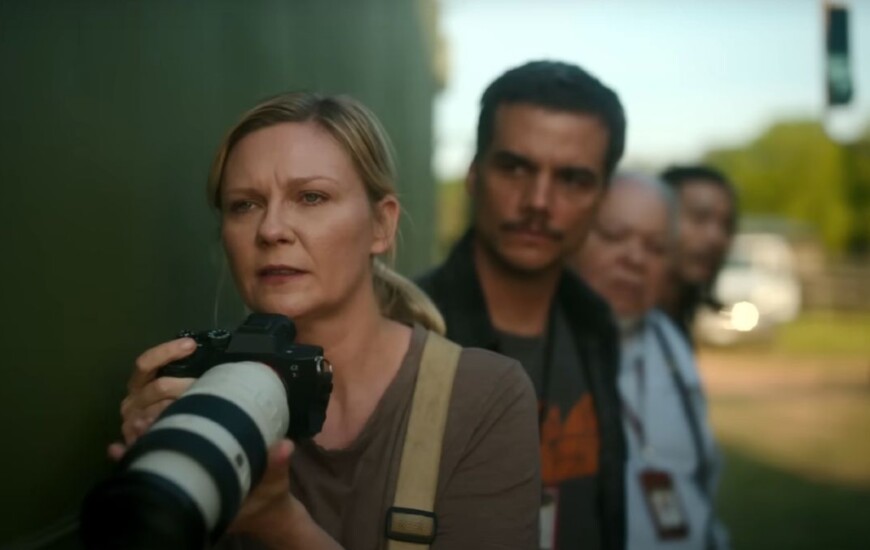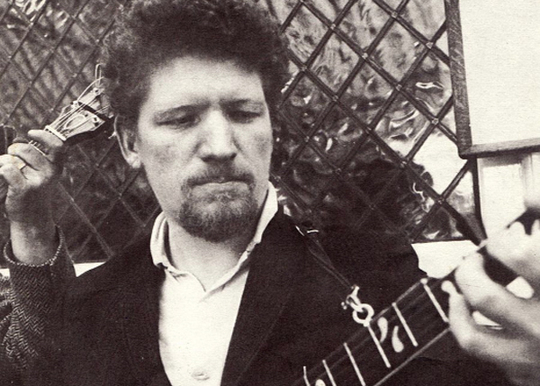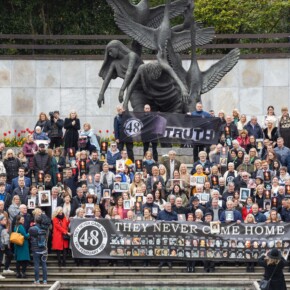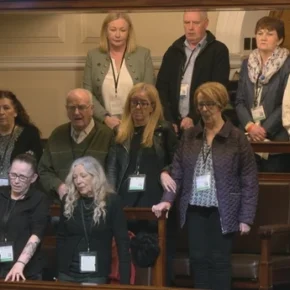Civil War fails to make the most of clever premise
Mike Finnerty 10 Apr 2024
The concept of a “national divorce” has been floated in American political circles over the last few years.
Arguments have been made that two Americas have emerged, and both cannot occupy the same space for much longer.
The upcoming presidential election is sure to inflame such tensions again, with candidates on both sides making the pitch for their version of America.
It is against this backdrop that English director Alex Garland has released Civil War, a film that depicts the United States falling back into a state of civil war.
Plenty of films have depicted society falling into a state of disrepair and are decidedly political in their outlook; Costa-Garvas’ masterpiece Z depicts oppression in a fictional country based on post-World-War 2 Greece, while Gillio Pontecorvo’s unforgettable Battle Of Algiers is an unflinching portrayal of guerilla warfare in a city setting.
Civil War has an incredible amount of potential and material past and present to draw form; it makes it all the more remarkable that it has absolutely nothing to say.
Alex Garland has made a name for himself as one of Britain’s most prominent auteurs after bursting onto the scene with The Beach and 28 Days Later, and in Garland’s best scripts you really get a sense of the sociology and inner workings of the worlds he has created.
When it matters the most, and with a sprawling canvas to play with, Garland fails to make the most of it.
The plot of Civil War follows a group of journalists who are making their way from New York to a war-torn Washington DC.
A terrific cast, led by Kirsten Dunst and Wagner Moura, take a road trip across the American countryside as they make their way across dangerous territory.
The structure of the film is akin to Hearts of Darkness or indeed Apocalypse Now; the main characters are trying to get from point A to point B, and they come across a number of dramatic incidents along the way.
Garland has experience working in video games, and the storytelling is clunky in the way that only video games can be.
One major plot point happens because characters make stupid decisions and it feels like bad decisions were made for the sake of it; the characters are needed in one specific place, so the film will have them do something brainless.
Civil War feels like a movie that was cut from a 3-hour cut or was chopped and changed in the editing process.
In 28 Days Later, Garland said he was inspired by the Rwanda genocide in writing a story of society totally crumbling and people being pitted against each other, and for Civil War you can see he’s going for something similar.
Garland, in his position as a British director, is putting a spotlight on America and presenting the film as an inverse of what America has done to the world in the name of peace and freedom.
On paper, this is a brilliant idea; shooting the film almost documentary-style and using photojournalists as the main characters is an inspired choice.
Garland subconsciously evokes news footage we saw during the Yugoslav wars in the 1990s or the Iraq War 20 years ago and juxtaposes it against typical American settings such as supermarket car parks or the White House.
The intent is noble, but the film collapses under its own weight.
The film is well-acted and well-directed, but the writing is the fatal flaw.
The film is intentionally and aggressively apolitical and has nothing to say about the people fighting the war.
For a film that focuses on journalists, it does a crummy job of showing an interest in people.
Dunst, Moura, Cailee Spaney of Priscilla fame and the ever-reliable Stephen McKinley Henderson try their best to flesh out characters that feel underdeveloped
The film’s high point comes in a scene when Jesse Plemons, looking like a member of Pantera, takes part in a tense stand-off with the main characters and grills them over their allegiance in the war.
In that moment, you fully understand Garland’s vision; a state of war does odd things to the mind and their ideology warps the view of the people fighting in it.
The scene is over as quickly as it began, and the balloon is gradually let out of the film from there.
If there was a longer cut of the film or a version of the film that had four or five more moments like this, it would be the profound film Garland thinks he’s making.
The audience has very little sense of why America has descended into a 2nd civil war and why people are acting in the way they are.
There is little to no indication given about the different factions in this war, why are people fighting, what they believe in, and what version of America do they subscribe to?
Other critics have argued that ambiguity is a bold artistic choice, but it can just as easily be read as Garland sitting on the fence and saying “both extremes are bad.”
Applying a West Wing lens to such a heated political issue is an unforced error that will taint the film’s legacy.
Don’t Look Up was an embarrassment, but at least you knew what that film stood for.
A scene at the end of the first act has the characters rest for the night while a raging battle happens down the road, the night sky illuminated by anti-aircraft fire and explosions rattling through what should be a quiet night.
The Zone Of Interest, the other controversial A24 film directed by an esteemed British auteur, was skilful in not depicting the horrors of the camps.
It works in The Zone Of Interest because you are sucked into the world of the film; in Civil War, you have no grounding for what the world of the film is.
There is one major difference; Jonathan Glazer is an accomplished visual artist who treats the audience with respect, Alex Garland is a writer who operates on a “my way or the highway” mentality.
Films like Civil War are the most frustrating to review; we respect when a filmmaker takes a swing with an original premise and we love it when a film feels in tune with a major happening in the culture.
That makes it all the more annoying when a film that has the power to say something profound opts to say nothing at all.
With that said, we’d much rather have 5 films of this ilk come out every year as opposed to an endless flood of smarmy Ryan Reynolds-starring action films where he’s aware of the concept of clichés.
Civil War is a noble failure and something of a Rorschach test for how you see a film; we are better off for having films like this playing in cinemas across the world.











